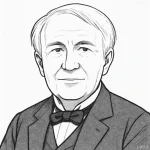“All men’s miseries derive from not being able to sit in a quiet room alone.”

- June 19, 1623 – August 19, 1662
- French
- Mathematician, Physicist, Inventor, Philosopher, Theologian
table of contents
Quote
“All men’s miseries derive from not being able to sit in a quiet room alone.”
Explanation
Pascal argues that the root of human suffering lies in our inability to embrace stillness and solitude. Rather than face ourselves in silence, we fill our lives with distractions—work, entertainment, ambition, even conflict—to avoid confronting the emptiness, fears, and existential questions that arise in quiet moments. For Pascal, restlessness is not just a symptom, but the cause of much misery, because it keeps us from introspection, humility, and ultimately, from God.
This idea is central to Pensées, where Pascal critiques the ways humans use diversion (divertissement) to escape the reality of their condition—mortality, weakness, and the longing for meaning. He believed that by refusing to be alone with our thoughts, we lose the opportunity for genuine self-awareness and spiritual clarity. Solitude forces us to confront who we are, and that confrontation, while uncomfortable, is necessary for truth and transformation.
In our contemporary world of constant noise, digital overload, and chronic busyness, Pascal’s insight is perhaps more relevant than ever. The inability to sit quietly—without scrolling, working, or escaping—often leads to anxiety, shallow living, and detachment from inner life. His quote calls us to reclaim stillness, not as idleness, but as a path to wisdom, peace, and authenticity, reminding us that solitude is not a punishment, but a gateway to understanding ourselves and the deeper truths that sustain us.
Would you like to share your impressions or related stories about this quote in the comments section?


